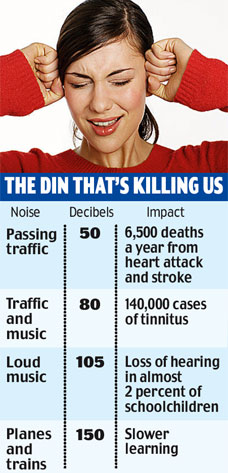We are open Monday to Friday
Product Hotline - 01993 704 981
Local call rate - 0208 0909586
NOISE CAN KILL!
Noisy neighbours and incessant traffic is killing ‘6,500 a year in Britain’
Excessive noise from modern urban life is killing thousands of Britons every year, the World Health Organisation has warned.
 Unruly neighbours, the incessant roar of traffic and booming music from pubs and clubs is to blame for a catalogue of health problems, including heart attacks and strokes.
Unruly neighbours, the incessant roar of traffic and booming music from pubs and clubs is to blame for a catalogue of health problems, including heart attacks and strokes.
Noise pollution also causes deafness, disturbs sleep and can even affect a child’s ability to learn.
The WHO report – the first to quantify the devastating toll of noise on health – estimates that three per cent of deaths from heart disease, including heart attacks and strokes, can be traced back to stress of long term exposure to noise from traffic.
This equates to almost 6,500 deaths a year in the UK. Leading audiologist Professor Deepak Prasher said: ‘The new data provide the link showing there are earlier deaths because of noise.
“Until now, noise has been the Cinderella form of pollution and people haven’t been aware that it has an impact on their health.”
Children’s hearing is also at risk, with noise from MP3s, pop concerts and discos damaging the hearing in almost 2 per cent of European seven to 19-year-olds, the WHO’s Working Group on the Noise Environmental Burden of Disease found.
The Royal National Institute for Deaf People warns that those who turn their MP3 up to the maximum 105 decibels for more than an hour a day risk permanent hearing damage.
Excessive noise can even affect learning, with studies showing that children in classrooms near railway lines are slower to learn to read than those taught in quieter rooms.
The WHO data, which is still preliminary, follows figures from the Office for National Statistics showing that noise complaints have increased five-fold over the past 20 years.
Noise takes its toll by keeping our bodies in a state of chronic stress, raising blood pressure and increasing the risk of heart attacks and strokes.
Disturbed sleep can aggravate already raised stress levels, while chronic stress lowers the body’s immunity to infection.
Professor Prasher, of University College London, said: “All this is happening imperceptibly and this is the key. Even when you think you are used to noise, these physiological changes are still happening.”
With noisy neighbours, stress might be triggered simply by knowing that a neighbour is in, even if they are not being noisy at that point.
Val Wheedon, of the UK Noise Association, told New Scientist magazine: “If you have no control over that noise, that’s what creates anger and stress and causes people to tip over the edge.”
The RNID is calling on the Government to set guidelines on noise exposure at discos and concerts and to educate young people about the effects of noise on health.
The Department for Environment, Food and Rural Affairs said it took the issue of noise ‘very seriously’ and is working on a strategy which will go out for public consultation later this year.
Published by the Daily Mail on August 22nd 2007. Article written by Fiona Macrae
